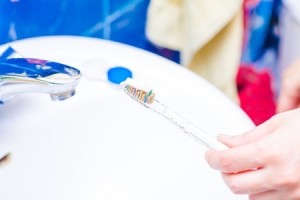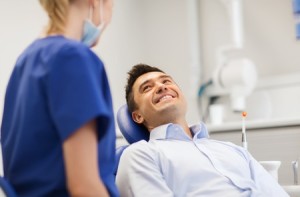By: Dr. Elizabeth Eggert
![]() Regular brushing, flossing, and visits to your dentist can go a long way in keeping your teeth and gums healthy and happy. But some of our patients wonder if they just might have bad luck when it comes to their oral health, no matter how often they brush, floss, or come in to see us, they still have issues with dental disease.
Regular brushing, flossing, and visits to your dentist can go a long way in keeping your teeth and gums healthy and happy. But some of our patients wonder if they just might have bad luck when it comes to their oral health, no matter how often they brush, floss, or come in to see us, they still have issues with dental disease.
According to Dr. S. Michele Robichaux of Nicholls State University in Louisiana, “almost every disease and disorder that affects . . . the mouth has a genetic component.” That’s true for the most common diseases—tooth decay and gum disease—as well as more pernicious conditions such as periodontal disease and dry mouth.
In fact, the Center for Craniofacial and Dental Genetics at the University of Pittsburgh found that your genes make up nearly two-thirds of the risk you face from tooth decay. That’s why you still get cavities when you lay off the sweets and brush and floss every day while your spouse slurps soda and chomps gummy candy with no oral health consequences.
Your Genes Affect Your Oral Health in Specific Ways
Your genes may make you generally more susceptible to oral diseases because they determine specific characteristics of your teeth and saliva. Your genes are responsible for how hard or soft your tooth enamel is. If it’s too soft, you’re more likely to experience tooth decay and sensitivity.
The quality and quantity of saliva in your mouth is also determined by your genes. Saliva helps break down acids bacteria create in your mouth. It contains minerals that help repair and strengthen tooth enamel, too. If you suffer from dry mouth or if your saliva does not have an average or high concentration of minerals, you are more susceptible to tooth decay and other oral health diseases.
Genetics Also Contribute to Tastes and Your Mouth’s Microbiome
Tooth enamel and saliva are one thing, but your genes also determine secondary characteristics that contribute to your oral health. A preference for sweets means you’re more likely to expose your teeth to sugar. Your ability to taste a variety of flavors is also linked to tooth decay, though scientists are still trying to determine why. Early research shows that people who can taste a larger variety of flavors are less likely to experience tooth decay.
Your genetic makeup also contributes to the diversity of the bacteria inside your mouth. The bacteria on your teeth are different from those on your tongue or under your gums. Your mouth’s unique microbiome may make it less or more likely that you’ll get cavities or periodontal disease.
If you lucked out with good oral health genes, you still shouldn’t eat or drink sugary, acidic foods with abandon. If you overindulge without regular brushing, flossing, and dental checkups, you still increase your chances of getting a cavity. And unfortunately, body chemistry tends to change over your lifetime, so developing good habits now will definitely pay off well into the future! To keep tooth decay in check, schedule your care and check-up today.





